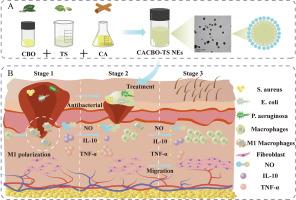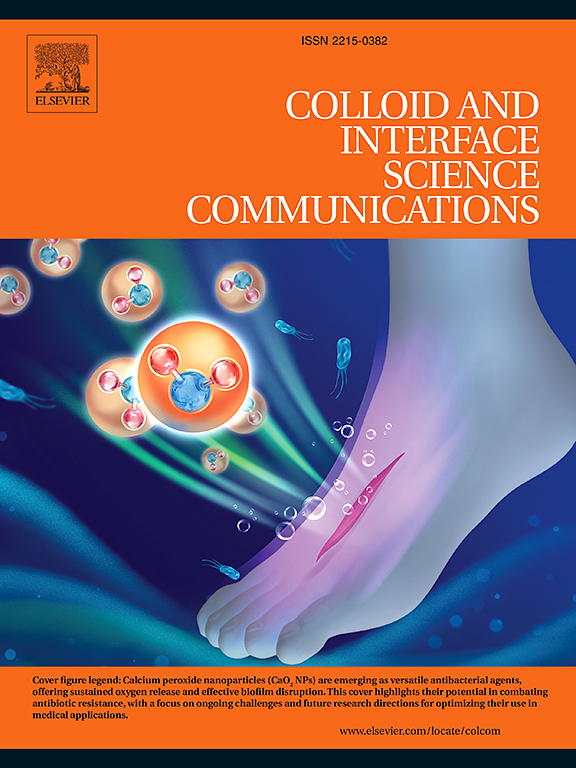Green preparation of nanoemulsion of Cinnamomum burmanni (Nees et T.Nees) blume essential oil loaded with cinnamaldehyde and evaluation of its antibacterial, anti-inflammatory, antioxidant and wound healing activities
IF 4.7
3区 材料科学
Q2 CHEMISTRY, PHYSICAL
引用次数: 0
Abstract
Cinnamomum burmanni (Nees & T. Nees) Blume oil (CBO) and cinnamaldehyde (CA) are natural compounds with promising wound healing. However, their application is limited by volatility. In this study, a tea saponin (TS)-stabilized nanoemulsion (CBO-TS NEs) was developed under conditions: 1 % CBO, 3 mg/mL TS, and 2 min of ultrasonication at 260 W. The CBO-TS NEs exhibited a particle size of 140.27 ± 3.11 nm and good stability under various conditions. After loading CA (10 μL) into CBO-TS NEs, the particle size becomes 156 ± 2.66 nm, and the transdermal delivery efficiency of CA was enhanced. The CACBO-TS NEs demonstrated notable anti-inflammatory and antioxidant activities, promoted the migration of L929 cells, and exhibited broad-spectrum antimicrobial efficacy. In vivo experimental results indicated that the CACBO-TS NEs achieved superior wound healing outcomes, underscoring a synergistic therapeutic effect between CBO and CA, highlighting the considerable application potential of CACBO-TS NEs for wound healing.

载肉桂醛的肉桂蓝精油纳米乳的制备及其抗菌、抗炎、抗氧化和伤口愈合活性的评价
肉桂油(CBO)和肉桂醛(CA)是具有良好创面愈合作用的天然化合物。然而,它们的应用受到波动性的限制。以茶皂素(TS)稳定纳米乳(CBO-TS NEs)为原料,在1% CBO、3 mg/mL TS、260 W超声作用2 min的条件下制备。CBO-TS NEs的粒径为140.27±3.11 nm,在各种条件下均具有良好的稳定性。在CBO-TS NEs中加入CA (10 μL)后,CA的粒径变为156±2.66 nm, CA的透皮递送效率提高。caco - ts NEs具有显著的抗炎和抗氧化活性,促进L929细胞的迁移,并具有广谱的抗菌作用。体内实验结果表明,CBO- ts NEs具有较好的创面愈合效果,表明CBO与CA具有协同治疗作用,CBO- ts NEs在创面愈合方面具有较大的应用潜力。
本文章由计算机程序翻译,如有差异,请以英文原文为准。
求助全文
约1分钟内获得全文
求助全文
来源期刊

Colloid and Interface Science Communications
Materials Science-Materials Chemistry
CiteScore
9.40
自引率
6.70%
发文量
125
审稿时长
43 days
期刊介绍:
Colloid and Interface Science Communications provides a forum for the highest visibility and rapid publication of short initial reports on new fundamental concepts, research findings, and topical applications at the forefront of the increasingly interdisciplinary area of colloid and interface science.
 求助内容:
求助内容: 应助结果提醒方式:
应助结果提醒方式:


